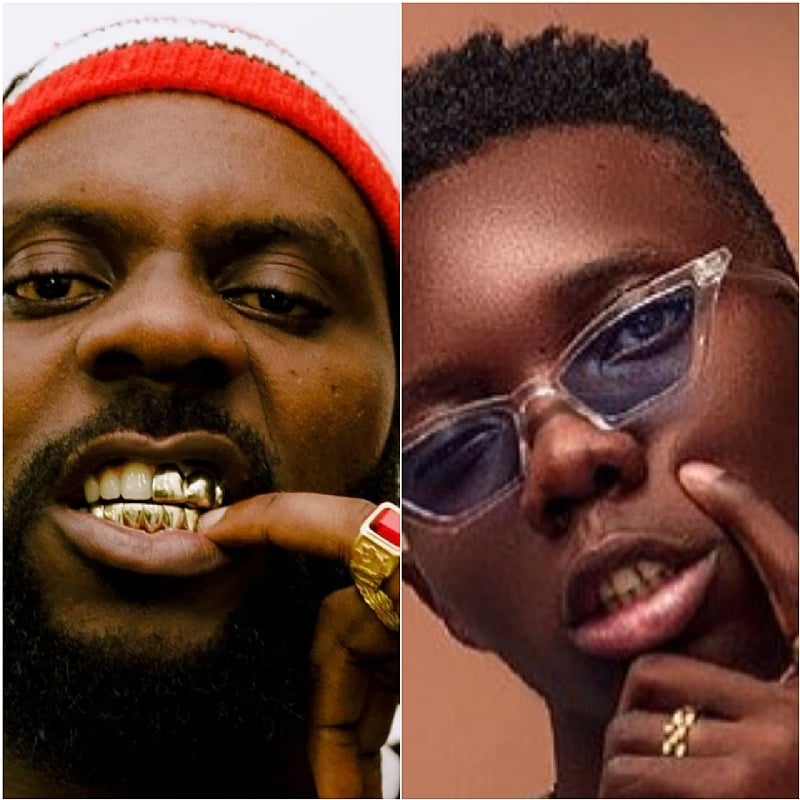The Nigerian rap scene has recently become the battleground for a heated feud between two prominent artists, Odumodublvck and Blaqbonez. What began as a lyrical jab within a song has rapidly escalated into a full-blown public exchange of disses, primarily playing out on social media platforms like Twitter. The conflict ignited when Blaqbonez, in collaboration with rapper A-Q, released the track “Who’s Really Rapping,” which contained lines perceived as a direct attack on Odumodublvck’s credibility and artistry. This ignited the spark, setting off a chain reaction of increasingly personal and pointed responses from both sides. The public nature of the feud has drawn significant attention from fans and industry observers alike, transforming a musical disagreement into a spectacle of verbal sparring.
Odumodublvck’s initial reaction to Blaqbonez’s lyrical provocation was swift and sharp. He responded directly to a tweet by Blaqbonez, asserting his dominance in the rap game and mocking Blaqbonez’s perceived lack of a recent hit song. His words carried a tone of aggressive confidence, claiming to embody everything Blaqbonez aspired to be while simultaneously belittling his opponent’s “weak spirit.” This direct and personal attack served to escalate the conflict beyond a mere lyrical disagreement, injecting a palpable element of personal animosity into the exchange. The tweet set the stage for a more aggressive and direct confrontation, challenging the established norms of hip-hop beefs that often remain confined to the realm of music.
Blaqbonez, unfazed by Odumodublvck’s retort, issued a challenge for a more traditional hip-hop response. He urged Odumodublvck to address the diss through a proper studio-recorded track, rather than resorting to social media jabs. He framed his argument around the established practices of hip-hop battles, emphasizing the importance of addressing lyrical attacks through musical responses. Blaqbonez further accused Odumodublvck of complaining to other members of the music industry about the situation, drawing a comparison to Kendrick Lamar’s approach to handling conflicts, implying a lack of professionalism and maturity on Odumodublvck’s part. This strategic move attempted to position Blaqbonez as the more seasoned and respectful artist, adhering to the unwritten rules of hip-hop engagement.
Odumodublvck, however, refused to be drawn into Blaqbonez’s preferred battleground of the recording studio. He countered Blaqbonez’s challenge by suggesting a different arena for their confrontation, hinting at a more personal and potentially physical altercation outside the confines of the music industry. This response highlighted the increasingly personal nature of the feud, suggesting a level of animosity that transcended musical differences. By suggesting a street-level confrontation, Odumodublvck shifted the dynamic from a lyrical sparring match to a more direct and potentially dangerous conflict, underscoring the intensity of the animosity between the two artists.
The escalating tension between Odumodublvck and Blaqbonez unveils a deeper commentary on the evolving landscape of hip-hop beefs. Traditionally, such conflicts were primarily played out through music, with diss tracks serving as the primary medium for exchanging lyrical blows. However, the advent of social media has provided a new and readily accessible platform for artists to engage in public sparring. This shift has blurred the lines between lyrical battles and personal attacks, often amplifying the emotional intensity and blurring the boundaries of professional rivalry. The Odumodublvck-Blaqbonez feud exemplifies this trend, showcasing how social media can become a primary battleground for hip-hop artists to air their grievances and engage in public displays of animosity.
The public nature of this feud raises questions about the authenticity of the conflict. While some observers view it as a genuine expression of artistic rivalry, others speculate that it might be a calculated publicity stunt designed to generate buzz and attention for both artists. In an industry increasingly driven by social media engagement and online visibility, manufactured beefs can be an effective tool for promoting new music and enhancing an artist’s profile. Whether genuine or orchestrated, the Odumodublvck-Blaqbonez feud highlights the evolving dynamics of hip-hop rivalries in the digital age, underscoring the influence of social media on how artists interact, compete, and ultimately promote themselves within the ever-evolving music landscape. Only time will tell if this conflict will be resolved through music, further social media exchanges, or perhaps even a more personal confrontation, but for now, it remains a captivating spectacle for fans and critics alike.














